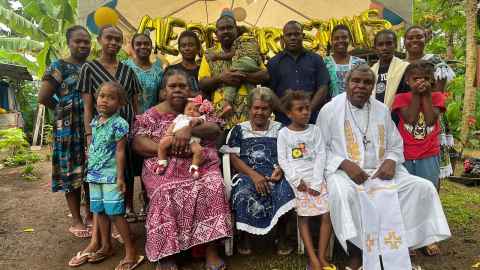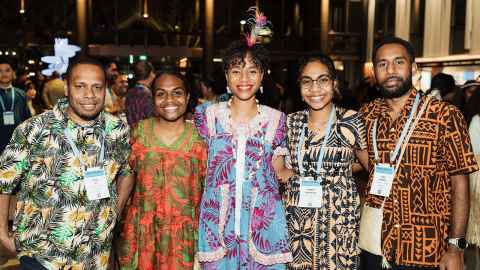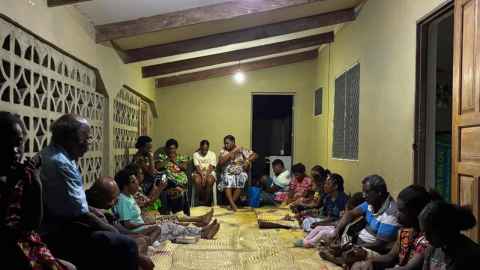Celebrate first Vanuatu Bislama Language Week
25 July 2025
Vanuatu Bislama Lanwis Wik launches in Aotearoa New Zealand, 27 July-2 August.

As Vanuatu celebrates a historic victory in its global climate justice campaign, Aotearoa New Zealand proudly launches its inaugural Vanuatu Bislama Language Week, 27 July to 2 August – a timely tribute to the strength, voice and resilience of the ni-Vanuatu people.
The milestone follows six years of advocacy and diplomatic manoeuvring that began in 2019 with a group of Pacific university students led by Vanuatu. On 23 July, the United Nations’ highest court, the International Court of Justice, affirmed the ruling.
The 2025 theme for Vanuatu Bislama Language Week is:
‘Tokabaot Klaemet Jenj – hemi ril mo yumi mas lukaotem laef’
‘Talk about Climate Change – it is real, and we must look after life.’
Vanuatu is home to approximately 138 indigenous languages, making it the country with the highest linguistic density per capita in the world. Vanuatu has three official languages: Bislama (an English-based creole and the most widely spoken), English and French.
A striking example of this linguistic richness is Malakula Island (slightly larger than Rakiura/Stewart Island) located about 350 km from the capital Port Vila, it has over 30 different languages spoken by 23,000 inhabitants.
Claire Samuel, a Bachelor of Nursing student at the University of Auckland, is thrilled to be in New Zealand celebrating her homeland of Vanuatu and the Bislama language.
“I’m so glad to be here for the first Vanuatu Bislama Language Week. When I arrived last year, they were just putting this initiative together – I think it’s so helpful for families to connect here in New Zealand, even though they’re not back in Vanuatu.”
I’m so glad to be here for the first Vanuatu Bislama Language Week. When I arrived last year, they were just putting this initiative together - I think it’s so helpful for families to connect here in New Zealand.

Now in her second year, Claire grew up in Port Vila and moved to New Zealand following in the footsteps of her parents, who both studied here. One of four sisters, she’s been fortunate to enjoy strong support with close friends and a fellow ni-Vanuatu student also studying at the University.
“I’m in my second year of nursing. It’s getting more practical now, with lots of placements. It’s a very unique experience.
“I applied for a scholarship with MFAT (Ministry of Foreign Affairs and Trade) and that’s been fantastic. I’m getting used to being here. There’s some homesickness, but I’m flatting in town with friends. One of them is also from Vanuatu, so that’s great.”
It’s an invaluable connection providing Claire with many opportunities to maintain her Bislama tongue.
“There are about four of us here at the University of Auckland, and a few more at AUT. Whenever we’re together, we speak in Bislama. It’s just so good.”
Although she started speaking French at kindergarten, Claire says she lost the language after her mother attended university in Australia.
“Mum started her masters in Melbourne, and once I switched to English, I lost my French. Now I speak just two languages – Bislama and English.”
Claire’s confident about having made the right choice in pursuing nursing.
“There’s high demand back home, and I wanted to help people. It was the perfect degree to pick.”

What I wish people knew about Vanuatu!
“I wish they knew where it was. People get confused – it’s right next to Fiji.
It’s really close to New Zealand, and it’s quite shocking that people don’t know that. I think it’s because they see a lot of Pacific people here – Polynesian or Micronesian – but they forget about Melanesian countries.
They know about the Solomons and even Papua New Guinea, probably because more people from those places are here. But they’re just missing the little islands.”
Claire says Vanuatu may not be as developed as some nations with a population of 335,000 but its people are resilient.
“We’re always getting hit by natural disasters and have political instability. But the people are important. They’re always hopeful. That’s one of Vanuatu’s strengths.”
Fun facts:
- Vanuatu gained independence on 30 July 1980 from France and the United Kingdom. Known as the New Hebrides before independence, the archipelago came under joint British-French control in 1903. Referred to as the condominium, the joint British and French colonisation was a result of neither power willing to surrender control over the archipelago.
- The Naghol Land Diving in the Southeast of Pentecost Island inspired Bungee Jumping in New Zealand. The ritual serves as a rite of passage for much of the island’s young men into adulthood. Land diving takes places seasonally with men attached to vines diving off carefully crafted towers, some as high as 30 metres. Boys as young as five jump off the lower levels, while more experienced divers descend from the top.